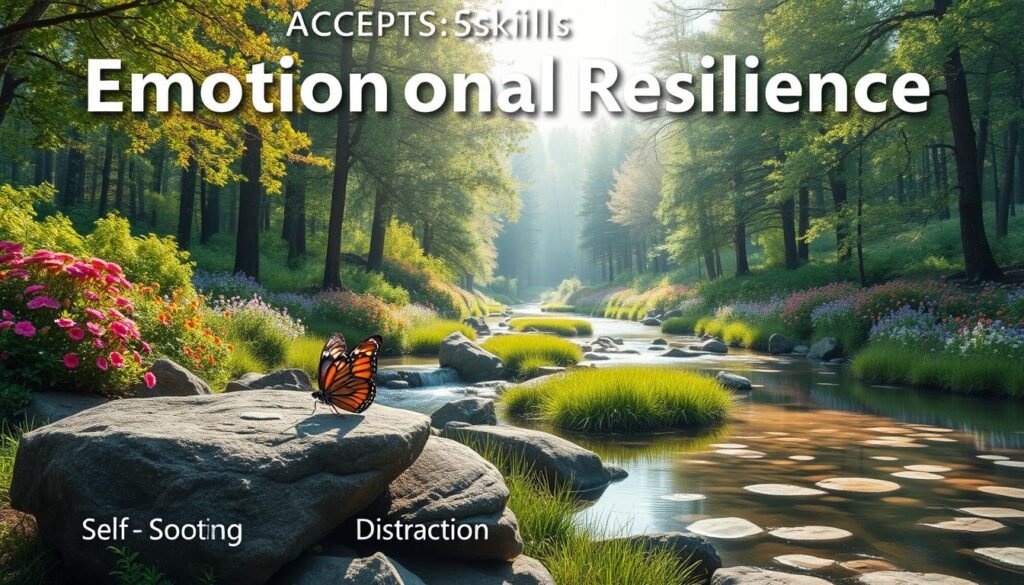Did you know that over 21% of Americans might face depression during their lifetime? With such a high number, it’s key to know how to manage depression. Dialectical Behavior Therapy (DBT) is a leading method that helps with distress tolerance. This therapy teaches people to deal with strong emotions and find better coping ways. It’s a big help for those facing depression.
DBT improves mental health strategies by teaching how to handle emotional pain. It teaches radical acceptance—accepting reality without judging it. It also shows specific ways to change emotional reactions. These steps help people use DBT to cope with distress. It brings hope and a better life quality for depression sufferers.
DBT allows individuals to learn distress tolerance skills through three types of sub-skills. These are crisis survival strategies, reality acceptance skills, and tolerance building. Practicing these skills daily can lessen anxiety and improve emotional control.
Key Takeaways
- Over 21% of Americans are likely to experience depression at some point in their lives.
- DBT offers crucial skills for managing emotional distress and improving coping methods.
- Radical acceptance is a key skill for building distress tolerance within DBT.
- DBT’s structured techniques can significantly enhance emotional resilience.
- Engaging in distress tolerance activities promotes healthier coping strategies.
Understanding Distress Tolerance in the Context of Depression
Distress tolerance is about handling intense emotional pain from hard situations or thoughts. It’s very important when dealing with depression, as people often feel deep sadness and anxiety. Learning to cope with this pain leads to better emotional control and coping methods.
Coping strategies are different from distress tolerance skills. Coping strategies try to solve stress, but distress tolerance is about living with discomfort. It teaches us to manage hard feelings in a healthier way. This stops the pain from getting worse and avoids harmful actions like substance abuse.
To get better at distress tolerance, there are techniques like distraction, self-soothing, and acceptance. The S.T.O.P. skill—Stop, Take a step back, Observe, Proceed mindfully—is a great way to deal with emotional pain. Radical acceptance helps people face tough realities without fighting them.
Using distress tolerance skills makes you more resilient and emotionally flexible. These skills are not just for depression. They help in relationships and overall happiness. Practicing these skills in everyday situations prepares you to handle bigger emotional challenges.
| Distress Tolerance Skill | Description |
|---|---|
| Distraction | Shifting focus from distressing thoughts to neutral or positive activities. |
| Self-Soothing | Engaging in comforting activities to alleviate emotional discomfort. |
| Radical Acceptance | Embracing difficult situations as they are, rather than wishing them to change. |
| Mindfulness Exercises | Practicing awareness of the present moment to cultivate emotional regulation. |
What is Dialectical Behavior Therapy (DBT)?
Dialectical behavior therapy (DBT) is a modern type of cognitive behavioral therapy (CBT). It was created in the 1970s by Marsha Linehan, an American psychologist. DBT is designed for people dealing with intense emotions. It helps with various issues, like borderline personality disorder, self-harm, eating disorders, and substance abuse.
DBT’s foundation lies in four key parts: mindfulness, distress tolerance, emotional regulation, and interpersonal effectiveness. Each part teaches useful skills for controlling and improving feelings. For example, mindfulness helps people stay in the present. This way, they can notice harmful thoughts and emotions.
Emotion regulation skills in DBT focus on handling hard feelings, often found in depression. These skills teach how to deal with emotions properly. This is especially helpful for those with Major Depressive Disorder (MDD). Distress tolerance gives tools for dealing with tough emotional situations. It includes methods like distraction and comforting oneself.
DBT combines individual and group therapy, plus phone coaching. This gives comprehensive support. The therapy usually lasts about a year. Yet, many see improvements in the first 12 weeks. By sticking with these detailed methods, people can take back control of their emotions. This greatly improves their life quality.
How DBT Can Help Manage Depressive Symptoms
Dialectical Behavior Therapy (DBT) helps people handle depression better. It focuses on controlling emotions and being more mindful. This approach gives people real ways to deal with their feelings. Many see their mood and well-being improve quickly after starting therapy.
Studies show that DBT benefits those with depression over time. It enhances emotional control and greatly reduces thoughts of suicide. This is especially true for those who haven’t been helped by other treatments. Learning to tolerate distress is key in turning stress into something you can handle.
More than half of the people taking part in DBT feel less depressed afterwards. Being able to manage emotional pain means better relationships and more happiness. Mindfulness helps people notice what triggers their depression and stop sudden, impulsive reactions.
DBT brings emotional stability and lasting ways to cope. It teaches a deeper understanding of one’s feelings to improve self-connection and relationships. Using DBT every day makes it easier to deal with depression.
Using DBT to Build Distress Tolerance for Managing Depression
Dialectical Behavior Therapy (DBT) helps people manage emotional pain better. It teaches them to deal with tough feelings without making things worse. This section talks about DBT’s main parts and how they work together to help people feel stronger.
Core Components of DBT
DBT has four key parts:
- Mindfulness Practices: Encouraging individuals to maintain awareness of the present moment.
- Emotional Regulation: Teaching skills to identify and influence emotions effectively.
- Distress Tolerance: Equipping individuals with skills to endure painful feelings without resorting to unhealthy behaviors.
- Interpersonal Effectiveness: Fostering the ability to communicate needs while maintaining self-respect.
Ways DBT Enhances Distress Tolerance
DBT offers various techniques for overcoming hard times:
- Crisis Survival Skills: Key in managing overwhelming emotions and situations.
- The STOP Skill: A critical strategy that helps individuals pause and assess their circumstances before reacting impulsively.
- ACCEPTS Technique: Offers methods to distract from distress by engaging in activities or evoking different emotions.
- IMPROVE Technique: Facilitates a positive shift in perspective through imagery and finding meaning in pain.
The TIPP skills offer quick ways to feel better. For example, splashing cold water on your face can help you calm down fast. Accepting emotional pain and focusing on how to move on can lead to a happier life.

| DBT Component | Description |
|---|---|
| Mindfulness Practices | Awareness of the present to reduce anxiety and promote clarity. |
| Emotional Regulation | Strategies for understanding and managing intense emotions. |
| Distress Tolerance | Skills for letting go of the distress without making situations worse. |
| Interpersonal Effectiveness | Techniques for improving communication and relationship dynamics. |
Exploring the TIPP Skills for Distress Tolerance
The TIPP skills are designed to help during emotional crises. They help manage intense feelings effectively. Each part of TIPP is crucial for dealing with emotional distress.
Temperature Techniques
Temperature control is a key part of TIPP. Changing body temperature can help adjust your emotional state. Dousing your face with cold water or taking a cold bath can calm strong emotions. On the other hand, warm showers may relieve depression or boost energy. These methods are fast and effective for regulating emotions.
Intense Exercise as a Coping Mechanism
Intense exercise is a vital coping tool in TIPP. Just 10-15 minutes of high-energy activity can help release emotions and distract from stress. Activities like running, jumping jacks, or dancing improve mood and wellbeing. Including intense exercise regularly helps with better sleep, self-esteem, and coping skills.
Paced Breathing Benefits
Paced breathing is a fundamental aspect of TIPP. It involves controlling your breathing to calm anxiety. Using techniques like “box breathing” helps manage stress. It makes you breathe in a rhythmic pattern. This practice aids in controlling emotional reactions and boosts emotional health.
ACCEPTS Skills for Managing Emotional Distress
ACCEPTS skills are key in managing emotional distress. They are coping strategies that help deal with strong emotions. Through various activities and techniques, one can build emotional strength. This helps to stay balanced in tough times.
Activities to Distract from Distress
Doing things you enjoy is crucial with ACCEPTS skills. When feeling very upset, focus on hobbies or interesting tasks. Some good options include:
- Taking walks in nature
- Practicing yoga or meditation
- Reading a favorite book
- Cooking a new recipe
- Solving puzzles or playing games
- Writing or drawing
These distractions can make it easier to handle tough emotions. They help you see problems in a new way. The aim is to not dwell on negative feelings. This makes rational thinking easier.
Contributing to Others for Emotional Relief
Helping others can greatly ease your own emotional distress. Doing kind acts, like aiding a friend or volunteering, brings a sense of purpose. Such actions offer personal relief. They also create a stronger sense of community. This shows how valuable relationships and community are for coping.
Emotional Comparisons for Perspective
When stressed, comparing emotions can offer insights. Realizing others face hard challenges too can give you perspective on your own issues. This encourages resilience. It reduces feelings of being alone. Techniques like imagining pushing away negative emotions can also help stay calm.

Mastering ACCEPTS skills improves handling emotional distress. It supports a more peaceful life by helping manage emotions better. To learn more, in-depth information is available.
| ACCEPT Skill | Description | Examples |
|---|---|---|
| Activities | Engagement in enjoyable tasks | Walking, cooking, puzzles |
| Contributing | Helping others to find purpose | Volunteering, assisting friends |
| Comparisons | Gaining perspective from others’ experiences | Recognizing shared struggles |
Practicing these skills helps address emotional needs well. It boosts overall well-being.
IMPROVE Techniques and Their Role in Emotional Regulation
The IMPROVE techniques help manage emotions during tough times. They offer coping strategies for better mental health and resistance to stress.
Imagery for Positive Outcomes
Imagery techniques help people see good results in their minds during hard times. This approach builds hope and allows for better handling of stress. By thinking of managing emotions successfully, people feel more confident and less powerless.
Finding Meaning in Painful Situations
This method is about finding lessons in hard experiences. It helps turn tough times into chances for self-improvement. This way, it becomes easier to handle emotional challenges with acceptance and understanding.
Relaxation Techniques to Reduce Stress
Relaxation methods like meditation and yoga are key in dealing with emotional stress. They lower stress and improve emotional control. Doing these activities helps people calm down, adjust their feelings, and face challenges with peace.
| Technique | Description | Benefits |
|---|---|---|
| Imagery | Visualizing positive outcomes and successful emotional management | Boosts confidence, reduces feelings of helplessness |
| Finding Meaning | Deriving lessons or insights from painful experiences | Transforms adversity into growth opportunities, promotes acceptance |
| Relaxation Techniques | Practices such as meditation and yoga to promote calmness | Reduces stress, enhances emotional regulation |
Adopting the IMPROVE techniques can greatly enhance emotional well-being. Making them part of daily life supports emotional growth and resilience.
To truly understand their value, we should look at how they tie to emotional regulation and mental health. Knowing regular practice can foster emotional health helps us handle stress better.
Implementing DBT Techniques into Daily Life
Using DBT techniques every day can help with managing anxiety. These skills help people become stronger mentally when facing tough emotions.
Mindfulness Practices for Staying Grounded
Mindfulness is key in using DBT techniques. These practices help people stay in the moment. This reduces anxiety and helps control emotions. Some good mindfulness activities include:
- Daily meditation sessions for clarity and focus
- Deep breathing techniques to calm the mind
- Grounding exercises, such as engaging the five senses
Adding these mindfulness activities to daily routines improves self-awareness and emotional steadiness.
Building Resilience Through Coping Mechanisms
Building resilience is vital for using DBT skills well. Coping strategies help people deal with emotional discomfort in everyday life. Some helpful coping methods are:
- Creative expression through art or writing
- Engaging in physical activities like yoga or walking
- Establishing a support system with friends and family
These strategies not only help with emotional health but also make dealing with stress easier.

The Effectiveness of DBT in Treating Depression
Dialectical Behavior Therapy, or DBT, works well for those battling depression. It shows better results compared to some other treatments. For instance, a study found that 75% of people felt much better after using DBT and medicine together for six months. Only 31% felt this improvement with just medicine. This shows how DBT helps people find emotional balance.
Statistics on DBT Outcomes
DBT offers a big boost to those who try it. One report with 101 participants showed fewer suicide tries and less need for emergency care than traditional treatments. DBT also improved thoughts of suicide and sudden urges in specific groups. It was especially helpful for women with a certain disorder, improving their social lives and decreasing self-harm.
Combining DBT with Other Therapies
Adding DBT to depression treatment can be very effective. It works even better when used with common depression drugs. This combination leads to a larger number of patients getting over their depression. It bridges different therapy methods, leading to better patient involvement and overall wellness.
It’s crucial to mix different therapy types for the best results. Those seeking effective depression treatments should consider DBT among other options. Checking out different treatment paths is a great step towards handling depression’s challenges.
Conclusion
DBT has shown great promise in managing depression. It combines techniques for controlling emotions and handling stress well. This helps in improving mental health overall. Through DBT, people learn to deal with strong emotions better. They learn to swap bad coping methods for good ones. As they get better at handling stress, they can manage depression symptoms better too. This helps them move through life with less difficulty.
Even though DBT doesn’t work for everyone, studies show it has its perks. It’s especially good at lowering anxiety and depression. This method helps not just those with major depression but also others struggling emotionally. By focusing on certain areas, DBT supports a broad range of people.
Taking part in DBT sessions can make people more resilient. Working with experts or joining therapy groups can boost mental health. DBT encourages living a life full of meaningful relationships and healthy emotional reactions. It offers a bright way forward for those dealing with depression’s challenges.